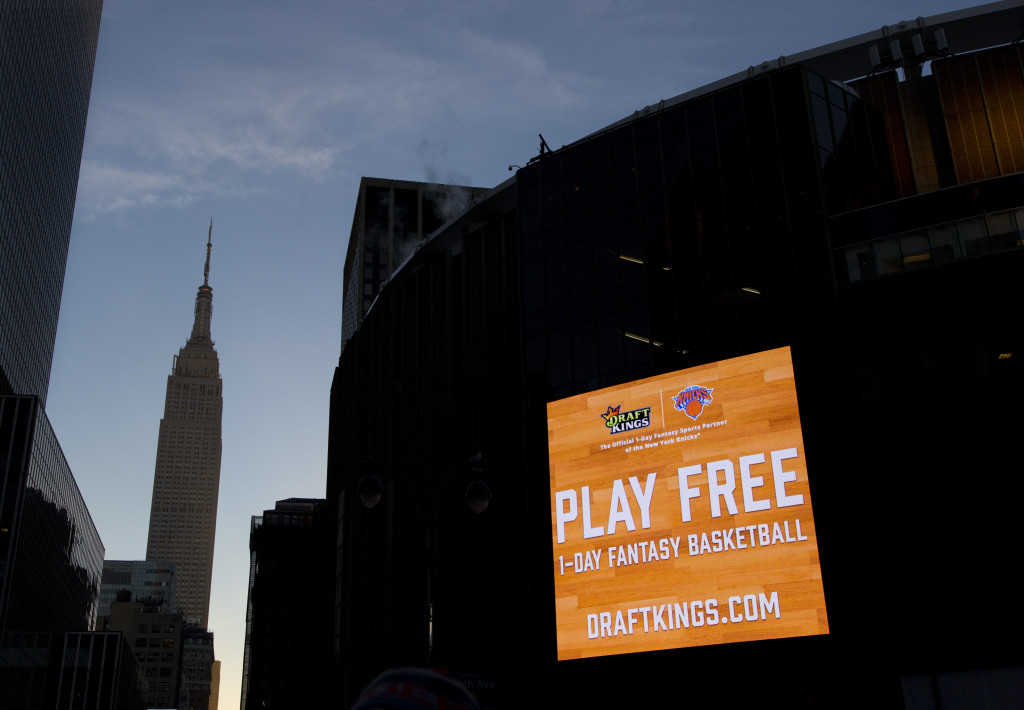DraftKings and FanDuel Put Betting On Hold In New York

March 21, 2016
Share
The nation’s largest two daily fantasy sports websites, DraftKings and FanDuel, will stop accepting bets in New York under an agreement announced on Monday with the state’s attorney general.
But the agreement may not mean the end of daily fantasy sports in New York.
Under the terms of the deal, arguments in a court case between Attorney General Eric Schneiderman’s office and the two websites will go on hold until September. If New York lawmakers pass legislation to legalize paid daily fantasy sports before then — which they appear on course to do — the sites will again be able to restart operations in the state, albeit under new regulation. If it doesn’t, the sites’ future could be decided by the courts.
“As I’ve said from the start, my job is to enforce the law, and starting today, DraftKings and FanDuel will abide by it,” said Schneiderman in a statement.
Before the agreement, FanDuel and DraftKings were facing the prospect of being forced out of New York. In November, Schneiderman’s office issued DraftKings and FanDuel a cease-and-desist order, saying that the betting that occurs on their sites violates New York’s online gambling laws. “It’s clear to us what they’re doing is gambling,” Schneiderman told FRONTLINE in a February interview. The sites have defended their contests as legal games of skill — rather than illegal games of chance, as many critics have argued.
Leaving New York would be costly for both sites. As a whole, the industry earned more than $267 million in entry fees from New York residents in 2015, and $24.8 in revenue, according to the research firm Eilers & Krejcik Gaming.
The focus until September will turn to a bill in the New York Senate that would legalize daily fantasy sports and introduce new regulations for the industry. The legislation would set a minimum age of 18; require a $500,000 registration fee; introduce a 15 percent tax on gross revenue; and place sites under the authority of the Department of Financial Services. The bill is currently in committee, but it mirrors similar legislation that has recently been introduced or passed legislatures in multiple states, including Virginia and California.
“I think DraftKings and FanDuel through this agreement avoided a potential doomsday scenario where they lose the lawsuit or lose on the claims alleging that the contests are illegal gambling. … This settlement alleviates that risk,” said Daniel Wallach, a gaming industry attorney with the firm Becker & Poliakoff.
In a statement, DraftKings said that it “will continue to work with state lawmakers to enact fantasy sports legislation so that New Yorkers can play the fantasy games they love.”
In a separate statement, FanDuel said that although “it is disheartening for us to restrict access to paid contests in our home state, we believe this is in the best interest of our company, the fantasy industry and our players while we continue to pursue legal clarity in New York.”
Clarity in New York, however, will not end every legal headache for the industry. Monday’s deal does not apply to Schneiderman’s case against DraftKings and Fanduel for false advertising and consumer fraud. Nor does it resolve legal obstacles elsewhere in the nation. In recent months, attorneys general in Hawaii, Illinois, Mississippi and Texas have all called daily fantasy sports contests illegal, and the industry has come under investigation by federal authorities in Florida, Massachusetts and New York.
“None of this affects any of the federal stuff. No impact. Eric Schneiderman can settle the whole case and it doesn’t bind what the U.S. attorneys offices are going to do or not going to do,” said Wallach. “When you start getting the federal laws involved … those federal laws provide U.S. attorneys offices with comprehensive, broad powers. That’s where the real disruptive event of 2016 could be, if and when indictments come down, and today’s settlement doesn’t change any of that.”

Related Documentaries
Latest Documentaries
Related Stories
Related Stories
Explore
Policies
Teacher Center
Funding for FRONTLINE is provided through the support of PBS viewers and by the Corporation for Public Broadcasting, with major support from Ford Foundation. Additional funding is provided the Abrams Foundation, Park Foundation, John D. and Catherine T. MacArthur Foundation, Heising-Simons Foundation, and the FRONTLINE Trust, with major support from Jon and Jo Ann Hagler on behalf of the Jon L. Hagler Foundation, and additional support from Koo and Patricia Yuen. FRONTLINE is a registered trademark of WGBH Educational Foundation. Web Site Copyright ©1995-2025 WGBH Educational Foundation. PBS is a 501(c)(3) not-for-profit organization.





















